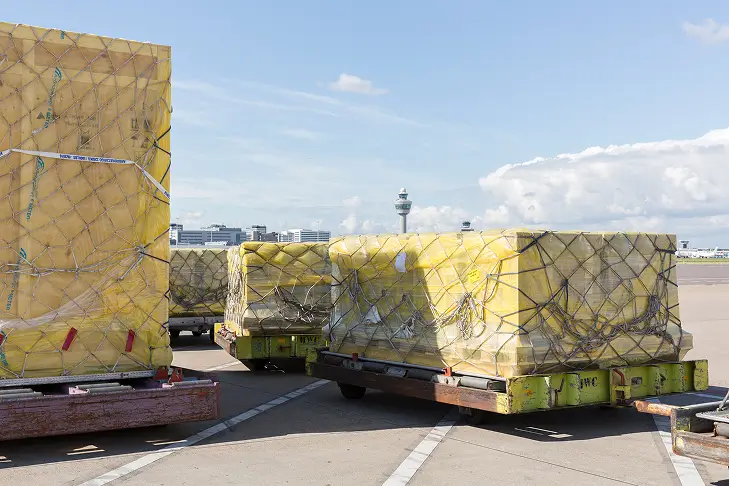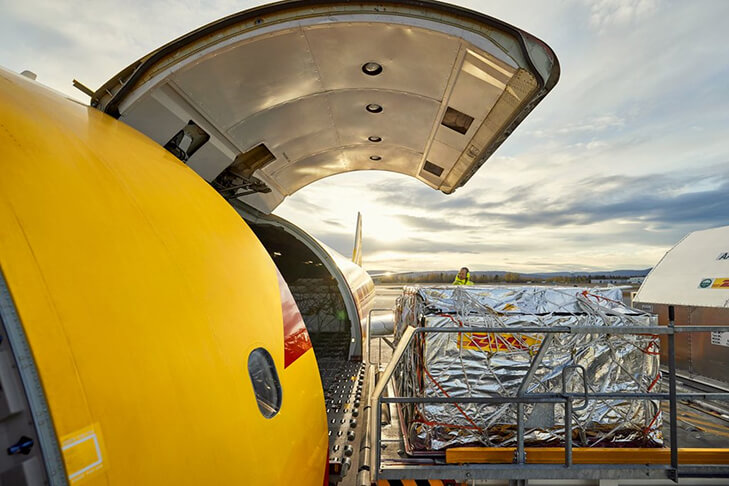Being based at Schiphol Airport gives us front-row seats to remarkable aviation strategies. Today marks a historic moment as MyFreighter's Boeing 767-300F makes its inaugural arrival at Amsterdam, launching twice-weekly operations from Shanghai via Tashkent.
Whilst our aviation enthusiast team has been following this aircraft's development and captured these images during its operations at other European airports, we're particularly excited to witness and photograph this strategic operation at our home base. This isn't just another cargo arrival—it's a masterclass in strategic route planning that we'll now be able to observe firsthand.
As aviation enthusiasts who understand complex charter coordination, we're fascinated by airlines thinking differently about connectivity. MyFreighter's approach demonstrates how the right aircraft, deployed through smart routing, creates entirely new market opportunities. Today's first Amsterdam arrival represents months of strategic planning reaching fruition.
The Boeing 767-300F: Perfect Tool for Hub Strategy
The Boeing 767-300F might not be aviation's largest freighter. However, for MyFreighter's hub operations, it's precisely the right aircraft. Understanding why reveals intelligent route planning principles that will guide their success.
Aircraft Capabilities That Enable Flexibility
Key Specifications:
- Cargo Volume: 438 cubic metres
- Maximum Payload: 52.4 tonnes
- Range: 6,025 kilometres at full payload
- Main Cargo Door: 3.40m x 2.59m dimensions
- Container Capacity: 11 standard LD3 containers plus bulk storage
The 767-300F's operational flexibility sets it apart from larger freighters. Unlike massive cargo aircraft requiring extensive ground infrastructure, this aircraft operates efficiently from mid-sized airports. Moreover, it maintains substantial payload capacity whilst accessing destinations others cannot serve economically.
Furthermore, the aircraft's 6,000+ kilometre range enables efficient Shanghai-Tashkent-Amsterdam routing. This capability proves crucial for hub operations requiring reliable connectivity across multiple sectors. According to Boeing's official specifications, the 767-300F delivers optimal economics for medium-haul cargo operations.
Tashkent Hub Strategy: Geography Becomes Competitive Advantage
MyFreighter's decision to centre operations in Tashkent reflects sophisticated market understanding. Rather than competing on established routes, they've created their own strategic pathway. Today's inaugural Amsterdam service validates this innovative approach to cargo aviation.
Strategic Geographic Positioning
Tashkent's location provides multiple operational advantages that support this new service:
Midpoint Efficiency: The city sits approximately halfway between Shanghai and Amsterdam. This positioning enables efficient fuel planning and crew scheduling whilst reducing total journey times.
Extended Network Access: From Tashkent, MyFreighter serves Central Asian markets often overlooked by major carriers. Additionally, connections to Middle Eastern and European destinations become viable through their hub strategy.
Infrastructure Advantages: Tashkent International Airport offers modern cargo facilities without the congestion affecting major hubs. Consequently, turnaround times remain predictable as operations scale.
Regulatory Benefits: Uzbekistan's aviation agreements facilitate transit operations across multiple jurisdictions. This regulatory framework proves essential for complex international routing now extending to Amsterdam.
The International Air Transport Association recognises hub positioning as crucial for cargo aviation success. MyFreighter's strategy exemplifies these principles perfectly through today's Amsterdam launch.
Operational Complexity Behind Hub Success
Operating successful hub operations requires coordination extending far beyond aircraft scheduling. MyFreighter manages intricate logistics showcasing aviation operational expertise. Today's inaugural Amsterdam flight tests these coordination capabilities under real operational conditions at a major European hub.
Ground Operations Coordination
Each hub rotation involves multiple coordination elements:
Cargo Handling: Efficient transfer between inbound and outbound flights requires precise ground team coordination. Furthermore, specialised equipment ensures proper cargo protection throughout handling processes.
Customs Processing: Transit cargo moves through multiple jurisdictions requiring expert documentation management. Additionally, bonding procedures must align across different regulatory frameworks.
Aircraft Turnaround: Fuel, maintenance, and cleaning operations occur simultaneously during ground time. Meanwhile, flight crews manage rest requirements and duty time regulations across international boundaries.
Weather Contingency: Alternative routing options remain ready when weather affects primary destinations. This preparation demonstrates operational maturity essential for reliable hub operations.
These coordination requirements mirror challenges we navigate daily in charter operations. Similarly, our Cargo Charter Service manages complex logistics across multiple jurisdictions for time-critical shipments.
Technology Integration Supporting Operations
Modern cargo operations depend heavily on integrated technology systems that MyFreighter deploys:
Real-Time Tracking: Advanced cargo tracking provides visibility throughout the journey. Subsequently, customers receive accurate delivery estimates and status updates across all route segments.
Documentation Management: Electronic systems streamline customs paperwork and regulatory compliance. Moreover, automated processes reduce delays and human errors during international transit.
Route Optimization: Sophisticated planning software optimises routes considering weather, traffic, and operational constraints. This technology directly improves efficiency and reliability for hub operations.
Crew Scheduling: Automated systems ensure regulatory compliance whilst optimising crew utilisation. Therefore, operational costs remain competitive across the expanding network.
Market Implications for Logistics Professionals
MyFreighter's strategy creates practical opportunities for supply chain managers seeking routing alternatives. Understanding these benefits helps evaluate when this service provides genuine value. Today's Amsterdam launch opens these possibilities for immediate exploration by European logistics professionals.
Capacity and Scheduling Benefits
Predictable Frequency: Twice-weekly service offers reliable capacity planning opportunities. Furthermore, scheduled operations provide better cost predictability than spot charter rates for regular shipments.
Flexible Booking: Mid-sized operations often accommodate special requests more easily than major carriers. Additionally, customer service remains more personalised and responsive to specific requirements.
Route Alternatives: Alternative routing reduces dependency on traditional cargo corridors. This diversification proves valuable when primary routes face disruption or capacity constraints.
Geographic Market Access
The hub strategy enables access to markets typically underserved by major cargo airlines:
Central Asian Destinations: Direct connectivity to Kazakhstan, Kyrgyzstan, and other CIS countries. These markets often require complex routing through traditional carriers with multiple connections.
Secondary European Cities: Onward connections from Amsterdam provide European distribution options. Moreover, truck connections enable door-to-door delivery across the continent.
Middle Eastern Extensions: Potential routing through Dubai or Istanbul opens additional market opportunities. These connections expand the effective network significantly beyond the core Shanghai-Amsterdam service.
Strategic Aircraft Economics
Understanding why the Boeing 767-300F succeeds in this operation reveals broader cargo aviation principles. Aircraft selection directly impacts route viability and operational success. Today's Amsterdam service launch validates these economic calculations.
Operational Cost Advantages
Fuel Efficiency: Twin-engine design provides superior fuel economy compared to older quad-engine freighters. Consequently, operating costs remain competitive across multiple route sectors required for hub operations.
Crew Economics: Two-pilot certification reduces crew costs significantly. Additionally, widespread 767 pilot availability improves operational flexibility and reduces training expenses.
Maintenance Accessibility: Global 767 maintenance networks provide service flexibility and cost control. Furthermore, parts availability remains excellent worldwide supporting reliable operations.
Airport Compatibility: Operation from airports with modest infrastructure reduces fees and delays. This compatibility proves crucial for secondary market access through the hub strategy.
Route Development Economics
Hub operations create economic advantages through network effects that will develop over time:
Load Factor Optimisation: Consolidating cargo from multiple origins improves aircraft utilisation rates. Subsequently, unit costs decrease whilst service frequency increases across the network.
Revenue Diversification: Multiple route segments generate revenue streams reducing dependency on single markets. This diversification provides operational stability during market downturns.
Operational Leverage: Fixed hub infrastructure costs spread across increasing flight frequency. Therefore, marginal costs decrease as operations scale from today's Amsterdam launch.
Lessons for Charter Aviation
MyFreighter's approach offers insights valuable to charter specialists and aviation professionals. Today's Amsterdam launch demonstrates these principles in action.
Strategic Positioning Principles
Geographic Advantage: Leveraging underutilised geographic positions creates sustainable competitive advantages. Similarly, charter operations benefit from understanding alternative routing options for client requirements.
Aircraft-Mission Matching: Success requires matching aircraft capabilities precisely to operational requirements. This principle applies whether coordinating humanitarian relief or corporate logistics solutions.
Regulatory Expertise: Complex international operations demand deep regulatory knowledge. Furthermore, this expertise becomes increasingly valuable as trade patterns evolve globally.
Operational Excellence Standards
Systematic Coordination: Successful operations result from systematic approach to complex logistics. Additionally, contingency planning ensures operational resilience during disruptions.
Technology Integration: Modern operations require sophisticated technology supporting efficiency and visibility. Moreover, customer expectations demand real-time information and professional communication.
Partnership Development: Strong ground handling and service provider relationships enable operational excellence. These partnerships prove crucial during challenging operational conditions.
Our comprehensive Aircraft Guide helps clients understand how different aircraft capabilities align with specific mission requirements for charter coordination.
Creating Pathways Through Strategic Vision
Today's MyFreighter Amsterdam launch reminds us why aviation remains endlessly fascinating. Behind every successful route lies strategic thinking transforming challenges into opportunities. This inaugural service represents months of careful planning reaching fruition at one of Europe's busiest cargo hubs.
From our vantage point at Schiphol, we'll now be able to observe this operation firsthand and capture the aircraft in action near our office. There's something special about witnessing strategic aviation planning come to life at your home airport.
Whether you're managing pharmaceutical distribution, coordinating manufacturing logistics, or developing supply chain resilience, the principles demonstrated here apply broadly. Success requires understanding how aircraft capabilities, operational expertise, and strategic positioning combine effectively.
This analytical approach guides our charter coordination services. We ensure clients receive solutions optimised for their specific requirements rather than generic approaches. Strategic thinking makes the difference between adequate service and exceptional results.
For insights into how strategic aircraft deployment supports complex logistics requirements, explore our analysis of air cargo charter transformation.
Strategic Aviation Solutions for Modern Challenges
MyFreighter's Tashkent hub demonstrates how strategic vision creates genuine market value. As trade patterns continue evolving, logistics professionals benefit from understanding alternative approaches providing operational advantages. Today's Amsterdam launch opens new possibilities for European logistics professionals seeking strategic routing alternatives.
The key lies in viewing aviation solutions strategically rather than tactically. Whether coordinating emergency relief, supporting manufacturing operations, or developing supply chain alternatives, strategic thinking enables superior outcomes.
Ready to explore how strategic aviation solutions might support your requirements? Contact our team for a consultation and discover how we apply similar strategic thinking to create reliable pathways through your complex logistics challenges.
Every cargo movement represents strategic decisions about moving goods efficiently across global markets. We take this responsibility seriously, applying genuine aviation expertise to ensure optimal routing and execution for every operation.
Get in touch with any questions about your air charter needs



